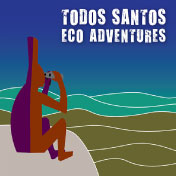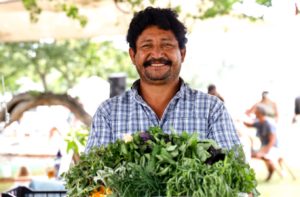
Mahi mahi straight from Agustin’s boat, strawberries with crème freche right out of Agricole, Nasturtium-adorned salads fresh from Jan’s farm, zillions of mangos, right from your own tree. This is the type of food security enjoyed by many residents of Baja California Sur (BCS). All fresh, all delicious, all healthy – and always obtainable in season.
BCS is the fastest growing state in Mexico, with vast sums of tourism-driven dollars flooding the state. This growth, rapid and seldom interrupted over the last few decades, has acted as a beacon to people across Mexico, drawing thousands of immigrants seeking economic opportunity. The Ministry of Economy reported a population increase in BCS of over 25% between 2010 and 2015, a rate which does not appear to have slackened. Yet BCS does not have the infrastructure or resources to adequately feed and house all the new arrivals, a fact that has given rise to a slew of informal settlements across the lower part of state, many without even the most basic of public services. Not coincidentally, the government agency CONEVEL states that in 2020 roughly 29% of the population in BCS was living in extreme poverty, with almost 35% of the population suffering from social deprivation, including deprivation of food access. In this land of plenty, accessing fresh, nutritious food is an extreme challenge for many.
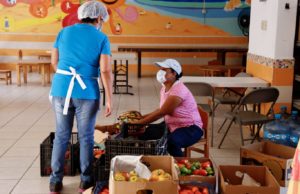 “The International Community Foundation (ICF) founded the Alianza Para la Seguridad Alimentaria (ASA, or BCS Food Security Alliance) in 2014 as an alliance of nonprofits, business owners, government agencies and individuals committed to addressing food insecurity in southern BCS” notes McKenzie Campbell, a program officer with the ICF. “When the pandemic slammed into Mexico in March 2020, BCS was one of the hardest hit states because of its heavy reliance on tourism. Food assistance groups exploded across the state, and by December 2020 many of these groups were serving more than twice their pre-pandemic population.” Because BCS did not have a state foodbank, these groups were spending precious time and resources sourcing ingredients. ASA mobilized to effectively become a mobile food bank for these groups, supporting their efforts with the distribution of despensas (packages of donated food and hygiene essentials) to the informal communities. Continues McKenzie, “It was when we were actively distributing despensas that we realized that without a formal government safety net or a reliable food supply, these communities would be in a constant state of crisis. The pandemic really showed that we needed a permanent solution to addressing food security in BCS.”
“The International Community Foundation (ICF) founded the Alianza Para la Seguridad Alimentaria (ASA, or BCS Food Security Alliance) in 2014 as an alliance of nonprofits, business owners, government agencies and individuals committed to addressing food insecurity in southern BCS” notes McKenzie Campbell, a program officer with the ICF. “When the pandemic slammed into Mexico in March 2020, BCS was one of the hardest hit states because of its heavy reliance on tourism. Food assistance groups exploded across the state, and by December 2020 many of these groups were serving more than twice their pre-pandemic population.” Because BCS did not have a state foodbank, these groups were spending precious time and resources sourcing ingredients. ASA mobilized to effectively become a mobile food bank for these groups, supporting their efforts with the distribution of despensas (packages of donated food and hygiene essentials) to the informal communities. Continues McKenzie, “It was when we were actively distributing despensas that we realized that without a formal government safety net or a reliable food supply, these communities would be in a constant state of crisis. The pandemic really showed that we needed a permanent solution to addressing food security in BCS.”
Luis Garduño, the director of ASA who was in charge of distributing despensas during the pandemic, says that the ICF doubled down on its commitment to food security during the pandemic. ASA had been formalized as an independent Mexican nonprofit in 2019, so it was the perfect platform from which to accelerate food security efforts in the region. Says Luis, “The first thing we did was conduct a series of diagnostic studies looking at all facets of the food system in BCS from producers, to distribution points, to consumers. Based on what we learned through these studies, ASA is focusing its efforts in three main areas: creating a Sudcaliforniano food bank, fostering community health and resilience, and piloting local foodsheds.”
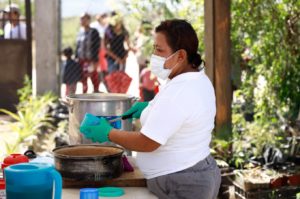 The food bank program is a remarkable testimony to ASA’s focus. Says Luis, “We are really excited about the progress that’s been made with the Sudcaliforniano food bank, and we expect it to be fully functioning with a presence in La Paz and Los Cabos by the end of 2022. We have secured warehouse space in both locations, and we’re working hard to source necessary items like trucks and cold storage.” The core of the food bank program is food recovery and redistribution, salvaging food that is deemed unsellable or unusable by producers and getting it to vulnerable populations. Notes McKenzie, “Around the world 40% of all food produced in the world is wasted and all those inputs lost. In Mexico, 20 million tons of food are wasted every year, enough to feed 70% of the population living in poverty. One of ASA’s first efforts was to assess food waste hot spots in BCS, then implement recovery, redistribution and prevention strategies.” Continues Luis, “In 2021 ASA provided 34 tons of recovered food to 5,800 individuals. Our goal is to be providing recovered food to 12,000 people on a regular basis by the end of 2022.” The Sudcaliforniano food bank is now affiliated with BAMX, Mexico’s national food bank program, and partners with its prepared food donation program, Al Rescate. It also receives and distributes regular donations from several Walmart-affiliated stores, Carl’s Junior and Earth Ocean Farms.
The food bank program is a remarkable testimony to ASA’s focus. Says Luis, “We are really excited about the progress that’s been made with the Sudcaliforniano food bank, and we expect it to be fully functioning with a presence in La Paz and Los Cabos by the end of 2022. We have secured warehouse space in both locations, and we’re working hard to source necessary items like trucks and cold storage.” The core of the food bank program is food recovery and redistribution, salvaging food that is deemed unsellable or unusable by producers and getting it to vulnerable populations. Notes McKenzie, “Around the world 40% of all food produced in the world is wasted and all those inputs lost. In Mexico, 20 million tons of food are wasted every year, enough to feed 70% of the population living in poverty. One of ASA’s first efforts was to assess food waste hot spots in BCS, then implement recovery, redistribution and prevention strategies.” Continues Luis, “In 2021 ASA provided 34 tons of recovered food to 5,800 individuals. Our goal is to be providing recovered food to 12,000 people on a regular basis by the end of 2022.” The Sudcaliforniano food bank is now affiliated with BAMX, Mexico’s national food bank program, and partners with its prepared food donation program, Al Rescate. It also receives and distributes regular donations from several Walmart-affiliated stores, Carl’s Junior and Earth Ocean Farms.
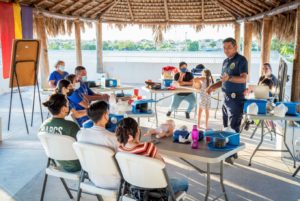 “Another thing we found when distributing despensas to the informal communities during the pandemic was that women were taking leadership roles and doing what needed to be done to protect not just their own families, but also the most vulnerable in their communities” recalls McKenzie. ASA’s second key initiative, community health and resilience, is designed to amplify that leadership, and give these women the tools they need to be even more effective. Continues Luis, “This program is multifaceted. Not only do we work with these women on leadership skills like decision-making, negotiating, effective communication and teamwork, but also on personal finance skills and small business administration skills. We help develop their skills to determine what is the most nutritious food they can buy for their families with the money that they have.” The program also teaches hurricane and emergency preparedness and response, including basic first aid, fire management, hurricane alert and preparedness systems and control centers for emergency response.
“Another thing we found when distributing despensas to the informal communities during the pandemic was that women were taking leadership roles and doing what needed to be done to protect not just their own families, but also the most vulnerable in their communities” recalls McKenzie. ASA’s second key initiative, community health and resilience, is designed to amplify that leadership, and give these women the tools they need to be even more effective. Continues Luis, “This program is multifaceted. Not only do we work with these women on leadership skills like decision-making, negotiating, effective communication and teamwork, but also on personal finance skills and small business administration skills. We help develop their skills to determine what is the most nutritious food they can buy for their families with the money that they have.” The program also teaches hurricane and emergency preparedness and response, including basic first aid, fire management, hurricane alert and preparedness systems and control centers for emergency response.
One of the key focus areas of the community health and resilience platform is nutrition and healthy cooking. Local groups like SINADES in Pescadero are at the forefront of this effort. Under the leadership of founder Inés Melchor Pantoja, with assistance from her husband, Julio César Rivas García, SINADES has been working with women in the community for almost two decades on a Conscious Cooking program, making healthy foods affordable, desirable and an integral part of family life. So that they could procure organic produce at a reasonable price, SINADES and the 18 women of the Conscious Cooking program started building greenhouses at their homes a decade ago. The greenhouses have given these women and their families much greater food sovereignty and economic stability, and 3 of them are now expanding into raising chickens. They are currently looking to formalize a point of sale for their chickens, eggs and chicks, and to expand the program to other women in town. SINADES is attacking food insecurity at its source.
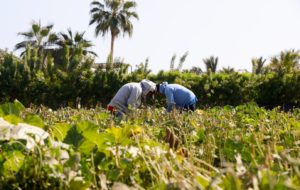 Raíz de Fondo is another community force based in La Paz. Founded by Erika Goetz 12 years ago as a community garden in a dirty, abandoned lot in downtown La Paz, Raíz de Fondo is now a driving force for nutrition, food security and sustainable living across the city. The group provides workshops to schools and communities on how start their own gardens, providing garden kits as well as on-going instruction on composting and nutrition. The program has been so successful that when the Secretary of Education (SEP) decided to launch a nutrition and wellness curriculum in elementary and preschools, Raíz de Fondo was tapped to train the teachers in their school garden program to deliver the curriculum.
Raíz de Fondo is another community force based in La Paz. Founded by Erika Goetz 12 years ago as a community garden in a dirty, abandoned lot in downtown La Paz, Raíz de Fondo is now a driving force for nutrition, food security and sustainable living across the city. The group provides workshops to schools and communities on how start their own gardens, providing garden kits as well as on-going instruction on composting and nutrition. The program has been so successful that when the Secretary of Education (SEP) decided to launch a nutrition and wellness curriculum in elementary and preschools, Raíz de Fondo was tapped to train the teachers in their school garden program to deliver the curriculum.
Another key Raíz de Fondo program is “Cocianado para la Colonia”. Based at the outdoor kitchen of one of their community gardens, Jardin Guamuchil, chefs prepare meals made with ingredients from the garden, as well as rescued food, to support community kitchens with limited resources. Erika says they plan to support 3 groups this year with a total of 3,000 meals. The team is further using this platform to teach healthy recipes to cooks from participating institutional kitchens. To support these programs, Raíz de Fondo has created a network of vegetable farmers who often have perfectly edible food that they cannot sell. They are thrilled to have Raíz de Fondo redistribute this food to those in need, and even get a tax deduction for their donation. Because of their extensive experience with local producers, Raiz de Fondo is a key partner in ASA’s food recovery and distribution program in La Paz.
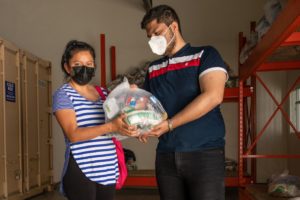 The third pilar of ASA’s food security platform in BCS is creating thriving local foodsheds by boosting the capacity of small and mid-sized farmers to produce healthy food for the local market. In June 2021 ASA started an “Agroecological Learning Collective” focused on the transition to a regenerative production model, employing farming techniques that improve soil quality. Currently 7 producers from 3 farms are participating in the pilot collective and have received 60 hours of technical assistance and 30 hours of regenerative management consulting. There is a great deal of excitement around this project, and local businesses like Sueno Tropical, Rancho Cacachiles and Baja Regenerative Farms are all pitching in with invaluable advice on production planning, crop selection and marketing. ASA’s Food Hub goal is to be the currently missing link of aggregation, distribution and marketing between local small and mid-sized producers and regional buyers and consumers.
The third pilar of ASA’s food security platform in BCS is creating thriving local foodsheds by boosting the capacity of small and mid-sized farmers to produce healthy food for the local market. In June 2021 ASA started an “Agroecological Learning Collective” focused on the transition to a regenerative production model, employing farming techniques that improve soil quality. Currently 7 producers from 3 farms are participating in the pilot collective and have received 60 hours of technical assistance and 30 hours of regenerative management consulting. There is a great deal of excitement around this project, and local businesses like Sueno Tropical, Rancho Cacachiles and Baja Regenerative Farms are all pitching in with invaluable advice on production planning, crop selection and marketing. ASA’s Food Hub goal is to be the currently missing link of aggregation, distribution and marketing between local small and mid-sized producers and regional buyers and consumers.
How can you help ASA implement this comprehensive approach to food security in Baja California Sur? Connect with these programs and lend your time, money, expertise, and enthusiasm:
ASA: https://asalimentaria.org; https://asalimentaria.org/en/
ICF: https://icfdn.org
SINADES: ; https://www.facebook.com/sinades.ac.7
Raíz de Fondo: https://www.raizdefondo.org
You can visit the community gardens every day but Sunday/Monday:
Huerto Comunitario Guamuchil
Calle Colegio Militar s/n, entre Ramírez y Altamirano, Colonia Esterito. La Paz BCS.
Huerto Comunitario Legaspy
Legaspy #443, entre Guillermo Prieto y Serdán, Colonia Centro, La Paz BCS.

